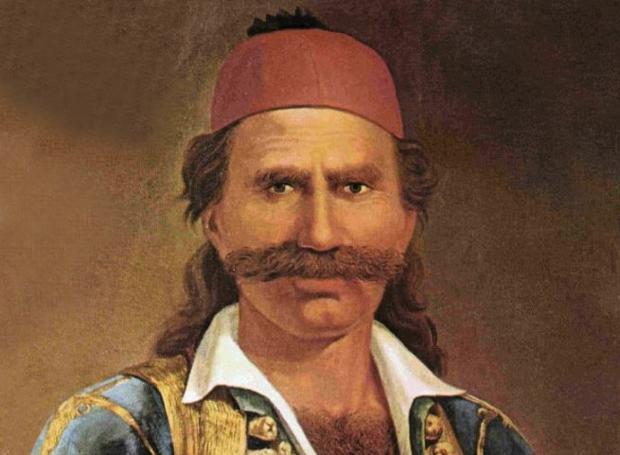ODYSSEAS ANDROUTSOS (1790–1825)

He was born in 1790 on Ithaca. His father was Andreas Verousis from Livanates in Lokris. At times his father cooperated with Ali Pasha, at others he was a brigand within Ali’s domain, and he ultimately became an associate of Lambros Katsonis. His mother, Akrivi Tsarlamba, came from a prominent family in Venetian-ruled Preveza; her father was a wealthy notable who cooperated with the Russians during the Russo-Turkish War.
Androutsos’s father devoted his life to fighting both the Ottomans and the wealthy kotzabasides (local magnates). He was captured by the Venetians, handed over to the Turks, imprisoned, and beheaded in 1792 in Constantinople. As a result, the young Odysseas scarcely knew him, being only three or four years old. His widowed mother moved to Lefkada in 1797. Odysseas grew up in an environment receptive to the new ideas that were then spreading ever more widely across the Ionian Islands under Western rule. The family of his mother—and her own character—played a decisive role in his upbringing. The Tsarlamba family were pillars of the pro-French faction in Preveza and took an active, leading part in the city’s defense when Ali Pasha attacked and captured it in 1798.
In 1818, while serving at Ali Pasha’s court—where he was under Ali’s protection thanks to the latter’s old friendship with his father—he was initiated into the Filiki Eteria by his teacher (Athanasios) Psalidas, who instilled in him a conscious sense of Hellenism.
At the same time, he learned the cunning, harshness, and suspicion that prevailed in the seraglio. He learned to be relentless toward enemies, to show compassion to the poor, and contempt for the kotzabasides and the clergy. Above all, he was a patriot, faithful to the oaths he had sworn upon entering the Filiki Eteria.
The purpose of his life was the freedom of the nation, within a truly democratic state.
Ali Pasha also looked after Androutsos’s personal establishment, arranging a good marriage: he wed Eleni Kareli, daughter of a notable from Kalarrytes in Epirus.
During the Greek War of Independence (1821), Odysseas Androutsos became one of the three great military figures remembered in the history of the struggle—the other two being Georgios Karaiskakis and Theodoros Kolokotronis.
All three of these great war leaders were, at various times, driven out, anathematized, and imprisoned.

